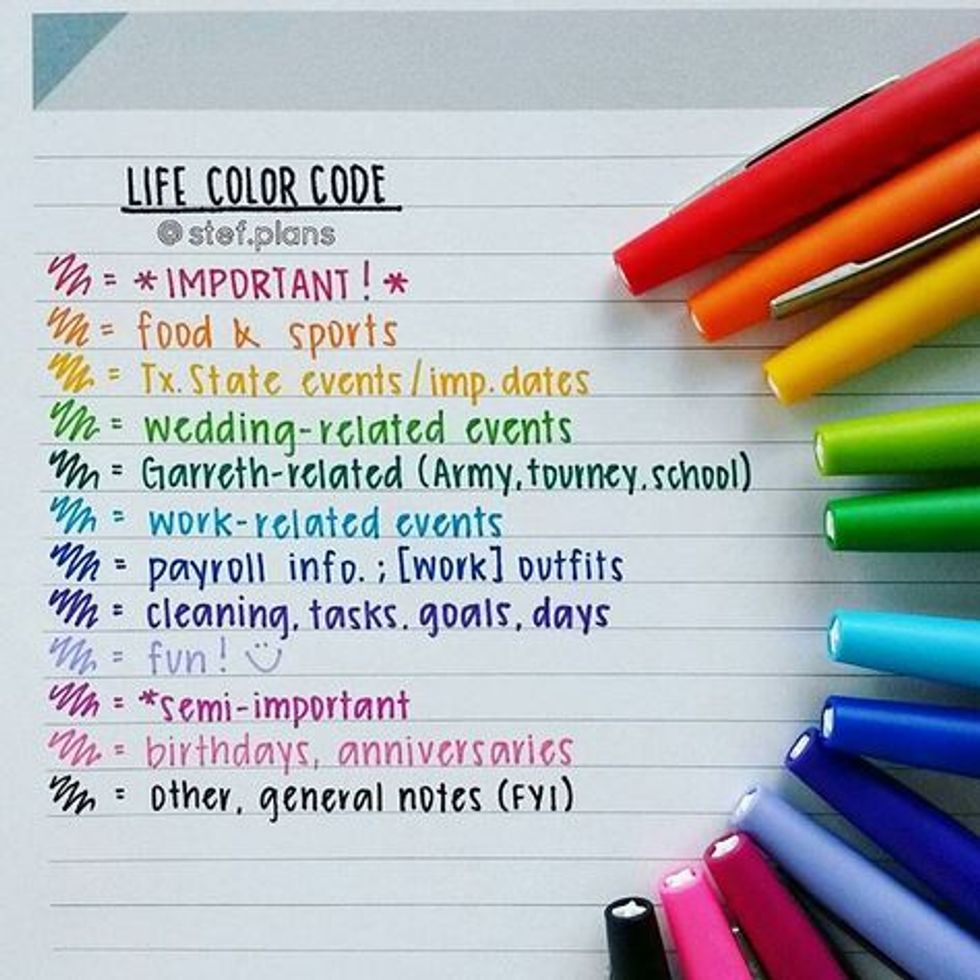1. Keep a planner/bullet journal
While this might seem obvious and cliché, having one space to write down all of your obligations and responsibilities can be crucial to staying proactive and open to opportunities. There are a number of options for keeping a consistent planner or journal:
- Keep track of events online with programs like Google Calendar, My Study Life or Week Plan.
- Purchase a traditional planner. There are a variety of brands (Moleskin, Ban.do, Kate Spade, etc.) and styles (ring-bound, dot grid, lined, etc.).
- Start a bullet journal and express some creativity.
2. Color Code
Bringing Leslie Knope energy to this book today - putting every scene on a notecard in Scrivener and color-coding them. pic.twitter.com/BKFIDtIi28
— Amy Tintera (@amytintera) October 16, 2019
So, you're jotting down everything in your planner and class notebooks. But, when everything is written in black ink, it can be extra effort to differentiate everything easily. This is where color coding is. While not all of us can afford to raid an office supply store for pens and washi tape, there are other alternatives that can help you to tell your chem lectures from your cousin's birthday. Consider using the built-in highlighting option on your phone, a Word document, or an online notebook or planner.
3. Get in Touch With At Least One Person from Each of Your Classes
Besides having a familiar face to chat with and a new potential friend, getting to know someone in your class can make things invariably easier in the long run. Whether you miss class and need to know what went down, are unclear about the homework, or just need to vent about how things are going, having that extra resource can give you an extra boost.
4. Block Off Certain Amounts of Time to Study Each Day
No matter what your college life looks like, there is undeniably much more to the entire experience than academics. Life can take up a lot of space that could be much more easily devoted to schoolwork in high school. So, whether you study at the same time each day or figure out which blocks of time per day work for your schedule, knowing when to study is one way to ensure that you are specifically responsible for staying on top of classes.
5. Find Your Study Space
As you become more familiar with campus, knowing which environments are best for you when you're studying is very helpful in boosting your focus. You may enjoy noise and working with others, so doing homework in a residence hall lobby or at the student union might be best for you. You might want a more subdued environment, like a quiet coffee shop or the library. Discovering areas that you're comfortable working in versus what environments might distract you is an important step in navigating your college experience.
6. Utilize Study Playlists
There's nothing worse than grappling with difficult subject matter in dead silence, and music can help to set your mood and motivate you to keep going and maintain energy. To avoid getting distracted by lyrics, consider listening to movie scores, classical music, or music in a language with which you aren't familiar.
7. Look for Useful Websites

As much as there may be an app for that, there is also a website. Personal favorites:
-Easy Bib (get MLA, APA, and Chicago citations for papers and assignments)
-Chegg (get cheap textbooks, as well as study tips, tutoring, and scholarships)
8. Think of the Bigger Picture
It's easy to become caught up with the everyday stress and demands of college, but it's important to think of why you're really at school. In graduating college, you will be part of 6.7% of the world who has a college degree and the benefits that come with it. Sure, there might be professors with ineffective teaching or grading methods, but the opportunity to gain the opportunities and benefits of a higher education are ultimately what you're doing this for, and that matters.
Happy studying! What tips have helped you to succeed in your college classes?




























